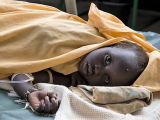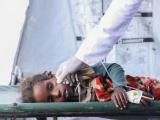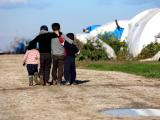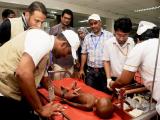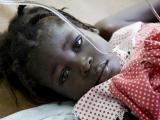The number of cholera cases reported in 2024 has declined compared with 2023, but deaths have more than doubled, according to the latest outbreak report from the World Health Organization (WHO).
Through September 29, a total of 437,724 cholera cases have been reported across five of the six WHO regions, a 16% drop from the previous year. But the 3,432 reported cholera deaths represent a 126% increase. The WHO says the spike in deaths may be attributed in part to where cholera outbreaks have occurred this year, such as conflict-affected areas where access to healthcare is compromised, regions where massive flooding has damaged critical infrastructure, and areas with inadequate medical facilities.
These conditions, particularly when they occur in rural and remote regions, can boost transmission and significantly hamper efforts to contain the bacterial disease, which spreads through water and food contaminated with the Vibrio cholerae bacterium. Cholera causes severe diarrhea and dehydration that can be life-threatening if it goes untreated.
Cholera cases have been rising globally since 2021, and case-fatality rates in some affected countries are some of the highest seen in a decade.
"The dynamics of cholera outbreaks are becoming increasingly complex, driven by factors that transcend borders—such as mass displacement, natural disasters, civil unrest, military conflict, and climate change," the WHO said. "Recent severe floods across Central and West Africa, as well as South-East Asia, have intensified cholera transmission, with several countries continuing to report surges in cases."
Vaccine supply depleted
Among the countries that have been hardest hit by cholera this year are Afghanistan (143,327 cases), Pakistan (60,369), Yemen (36,404), the Democratic Republic of Congo (DRC; 25,221), Ethiopia (23,391), and Sudan (20,062). The DRC and Sudan are among the countries in which ongoing conflict is increasing the risk of cholera transmission and preventing people from accessing healthcare.
Since the September report, new cholera outbreaks have been reported in Niger (705 cases) and Thailand (15 cases), bringing the total number of affected countries this year to 30.
The dynamics of cholera outbreaks are becoming increasingly complex, driven by factors that transcend borders—such as mass displacement, natural disasters, civil unrest, military conflict, and climate change.
The WHO said immediate investment is needed for rapid emergency response to the surge in cases, and that it will continue to work with UNICEF and other partners to continue streamlining the supply of essential cholera materials to countries in need. But it also noted that, as of October 14, the global supply of oral cholera vaccine is depleted, with no doses available. Of the 8.4 million doses requested by five countries from September 1 to October 14, only 7.6 million could be shipped.
"Although more doses are expected in the coming weeks, this shortage poses significant challenges to outbreak response efforts and hampers efforts to control the spread of the disease," the agency said.



